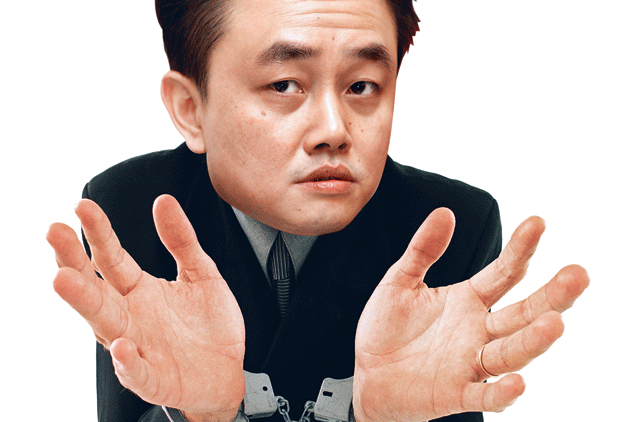
Sitting in cell eight at Beijing's Number One Detention Centre on Christmas Eve, China's richest man received some bad news. Government prosecutors claimed to have discovered new evidence that under Chinese law allowed them to restart the clock on an investigation that has already cost him more than 14 months of freedom.
Huang Guangyu, founder of Gome, the country's largest electronics retailer, has been held since late 2008 on suspicion of crimes including insider trading. His arrest came only weeks after Huang was named the wealthiest individual in China by the authoritative Hurun Rich List.
But thanks to an opaque and highly politicised justice system, the Chinese public knows almost nothing about the fate of one of its brightest entrepreneurial stars, how he is being treated or what it was that he allegedly did wrong. Some in the Beijing establishment are understood to have considered him a Mikhail Khodorkovsky figure and just as with Russia's former richest man, a Kremlin critic who languishes in a Siberian jail convicted of fraud feared Huang would turn his attention to politics.
Huang's case, the latest in a long line of corruption investigations to have toppled rich Chinese citizens, will test the credibility of the country's legal system and the avowed desire of leaders to tackle a lack of transparency, integrity and fairness in its business world.
According to one retired senior official from the top ranks of China's security apparatus, the real reason for Huang's downfall was that he was just too big a businessman: his company had grown so large that it had become systemically important to the Chinese economy, with thousands of factories and millions of jobs dependent on Gome and Huang. Leaders thought it should be broken up or placed in a safer pair of hands. They appear to have got their way: the company is now nowhere near the powerhouse that it was before the removal of its founder.
Rags-to-riches tales have become almost a cliche in modern China but Huang's life story is extraordinary even so. Born in a rice-farming hamlet near Shantou on the south-east coast, into a family so poor that even the other village children would tease him, he was buoyed by stories from his Roman Catholic parents about the Bible and about ancestors who had been traders throughout Asia.
After dropping out of school at 16, he and his brother headed for Inner Mongolia in China's far north, taking with them a few bags of radios and batteries to sell and just 4,000 yuan (Dh2,149). From there they went to Beijing, setting up a stall near Tiananmen Square.
At a time when the electronics market was dominated by ration coupons and myriad government middlemen, Huang (who is also known by the Cantonese version of his name, Wong Kwong Yu) showed his capitalist instincts by buying goods directly from the new factories in his Guangdong home town and selling them in Beijing.
Growing too fast
Thus was built a Gome empire that at its height had some 1,350 stores and, through a listing on the Hong Kong stock exchange, was valued at as much as Hong Kong $68.7 billion (Dh32.4 billion). But according to the retired security official, the suave Huang not yet 40 by the time of his arrest had offended powerful political interests along the way, particularly through aggressive acquisitions of competitors after 2005.
Another person with close contacts to the military establishment in southern China says Huang's political backing was too weak to protect him from rivals.
Most Chinese assume that their richest compatriots must have committed crimes or they could not have become wealthy in the first place. That was simply because, the theory goes, the legal system in place when such people began their careers actively prevented the accumulation of wealth: without breaking the law, they could not do business.
"In China, a lot of people have got rich by cutting corners," says Lester Ross, Beijing head of WilmerHale, a US corporate law firm. "It used to be the case, and it still substantially is, that you don't ask people how they made their wealth, because it's not a clean sheet."
But Wang Rongli, a Shenzhen lawyer who has made a study of entrepreneurial corruption, points out that by no means all convictions relate to activities early in their career: "In recent years, entrepreneurs have been put into jail due to their recent crimes, instead of crimes during their original capital accumulation period."
He says many Chinese entrepreneurs know little about the law and ignore the legal advisers they pay to tell them about it. In-house lawyers are reticent to warn the boss about legal risks for fear of annoying him, he says, noting that many entrepreneurs ignore illegality because they believe political connections can override any problems.
To make a case against Huang and Zhou Yafei, Gome's former chief financial officer, who is also being held in the detention centre, investigators are thought likely to rely on confessions from others. Given the complexity of financial crimes and the lack of expertise among investigators, they have little choice.
According to an ex-cellmate of Zhou, the Gome duo were frequently removed for interrogation from the 8-metre by 5-metre cells that each of them shared with 11-13 others. Huang "was taken out for questioning much more than other inmates and he was even taken out on weekends and in the middle of the night, sometimes from around 2am until 6am", says this person.
"For such a big case it didn't seem the investigators were up to the task; [Zhou] told me they just kept asking the same questions over and over."
Beijing Number One Detention Centre is a top-security facility that houses accused criminals who face life sentences in prison or the death penalty. It has its own execution chambers and is also where foreigners suspected of committing crimes in Beijing are sent.
According to Zhou's former cellmate, a foreign man who spent seven months in Beijing Number One and posted about it on Danwei, an English-language website about China, life inside is numbing. Long hours are spent on ‘the board', a platform on which inmates sleep at night and have to sit bolt upright by day. "Leaning too far forward, leaning too far back, and even crossing your legs was forbidden," he notes.
The diet is grim beef only once a month and lights are never turned off. "No torture, no rape in the shower: just the good ol' psychological torture of close confinement."
As with other high-profile prisoners such as senior government officials, Huang and Zhou were given numbers on arrival in an attempt to stop guards or inmates recognising who they were. The system rarely works and Zhou's cellmates soon stopped referring to him as ‘1102' and called him by his real name.
A 42-year-old with big buck teeth and trousers pulled up to his chest, Zhou expected that he and Huang would be released by last November, adding that he was being held only as a witness to Huang's alleged crimes. Zhou "was convinced Huang Guangyu was not going to serve a lot of time and that even if he was handed a long sentence he would be out of prison after a short time", says his former cellmate.
August company
Soon after Zhou arrived he was appointed number three in the cell, establishing his initial place in a pecking order of detainees that included two government officials accused of taking bribes, an editor of a newspaper similarly accused, a property scam artist, a businessman who had not paid his taxes, four African drug dealers, an Iranian thief and an American shoplifter. Zhou had bribed the guard in return for special treatment, according to the cellmate.
The inmates are largely cut off from the outside world: the prison does not allow them to read Chinese-language reports related to their case and they rely on random cuttings from the English-language state-run China Daily that are slipped past the prison censors.
It was from a China Daily article that Zhou learnt Bain Capital, the Boston private equity group, had bought into Gome last June. It was also from cuttings that he was able to see the company's stock price plummet in the wake of his and Huang's arrests.
So far, no outsider knows the reason for Huang's long detention. Is he guilty or did he simply cross the wrong faction? Is he, as some suggest, the victim of an ideological shift in the Communist party against unbridled private enterprise?
Did he do anything worse than grow rich? The way these questions are answered could prove a telling test of the complicated relationship that links law, business and wealth in modern China.
— Financial Times












